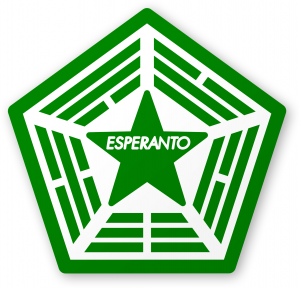Fun with Esperanto
 Back in my high school days, I spent a lot of time in the public library. One day I discovered an old red book that was an introduction to Esperanto. For those of you unfamiliar with the concept, Esperanto is an artificial language (also called a constructed language or a conlang). Natural languages like English or French develop slowly over centuries of societal change. Natural languages are messy, with many irregularities and exceptions. Conlangs are different. They are created wholesale, often by one person for a specific purpose. Such is the case here.
Back in my high school days, I spent a lot of time in the public library. One day I discovered an old red book that was an introduction to Esperanto. For those of you unfamiliar with the concept, Esperanto is an artificial language (also called a constructed language or a conlang). Natural languages like English or French develop slowly over centuries of societal change. Natural languages are messy, with many irregularities and exceptions. Conlangs are different. They are created wholesale, often by one person for a specific purpose. Such is the case here.
Esperanto started with one man in the late 1800s. L.L. Zamenhof lived in an area of central Europe where there were a half-dozen languages in use. As a Polish Jew, he spoke Polish and Yiddish. And since Poland had been divvied up between Austria, Germany and Russia, he also spoke German and Russian. Zamenhof thought things would be a lot simpler (and more peaceful) if everyone had a single, neutral language to speak. So he cobbled together bits and pieces of other languages to make his own. The result was a language called “Esperanto” (“one who hopes”).
Most Indo-European language speakers can understand Esperanto easily, as it takes words from Latin, German, French, Russian and English. Learning the grammar is easy too. There there are no irregular verbs. No weird exceptions. All you have do is learn one rule, and you can apply it to any sentence. As a teenager, I found it fascinating. And while I couldn’t speak it fluently, I think it’s a fun thing to learn.
Update
I must say the response to this short little article has blown me away! Unlike so many other constructed languages, Esperanto has a strong community to support it, both online and in real life. I’ve enjoyed hearing from Esperantists from around the world. Dankon!
Have you studied Esperanto? If so, what was your experience? Sciigu min en la komentoj sekcio.








Hi Steve,
I happen to be an esperantist living in Canada. My first language is Chinese, second English, third Esperanto, and I am learning Spanish and little bit French. I would love to exchange ideas with you about these languages. Ask me any questions you may think of, and I will try to answer…
Thanks
John Huang
It is not enough to learn Esperanto. To get its full benefit, you have to use it. Esperanto was started as an “artificial language” (I prefer “planned language”) 125 years ago. After being used during more than a century, Esperanto has evolved like any other language. Thousands of books exist, about half of them original Esperanto, half translations from many other languages.
Today’s Internet makes very easy to use Esperanto. Traveling also helps. There are thousands of books and magazines in Esperanto available in the web for free … also videos, songs, pod casts, all kinds of web pages …
Six months ago I visited Hanoi, Vietnam, and Seoul, Korea. In both countries several young people took me around for me to know their towns … all the time speaking in Esperanto. I also help Esperanto speaking travelers when they visit the region where I am at the moment. I am also ready to help anybody than wants to learn Esperanto.
Enrique
from California, near San Francisco.
Saluton, Stevo! Mi estas Esperantisto, kaj mi lernis ĝin dum mi havis 9 jarojn…ĉe la librejo ankaǔ. Sed mi bedaǔrinde forgesis la plejparton de la lingvo ĝis antaǔ 10 jaroj, kaj mi estas fluenta kaj mi ŝategas la lingvon. Mi legas multajn librojn Esperante kaj mi klopodas iri al mi loka kunveno kiam mi eblas.
Mi esperas, ke vi relernas nian belan lingvon!
Se oni bezonus bonan retan vortaro, bv iri al http://www.simplavortaro.org/
ĝis!
Mi estas Esperantisto, kiu loĝas en Nov-Ĵerzio. Mi ne estas talenta kun la lingvo-lernado sed mi scias la fundamentojn de Esperanto. Mi ankoraŭ bezonas pli-konstruadi mian vortenhavon.
I work with local museums and mass transit planning and I make it a point to try and wear my green star when I’m out.
I’m hardley fluent but I believe it’s important to be there, to try and to help when language becomes a barrior.
If you are an Esperantist you are more than a devote to language, you are an ambasador of good will.
In your home, in your community, in your state, in your nation and beyond… be Esperanto.
Here’s a hint for all you bloggers – publish something about Esperanto, and the Esperanto-network will send a load of hits and comments your way! 😉
Better yet, ask a question about Esperanto – “Is Esperanto around any more?” “Hasn’t English replaced Esperanto as a lingua franca?” – and watch the comments roll in.
Hi, my name is Bobby Teh and I am from Singapore. I am trying to learn Esperanto. Nobody in Singapore speaks it, even my teacher because there is nobody to speak to in that language. I am trying to pick it up but without an outlet to speak it, one simply cannot improve in the language.
I love songs and music. I am delighted to have learnt by memory to sing this song in Esperanto as i cannot sing it in its original text, in German. The song is Exuropo Himno Esperanto which is Beethoven’s Symphonie Nr. 9.
I am trying to lay my hands on a CD – “Kantu Ni Kune, so that I can learn more songs that I already know how to sing in English, and be able to sing it in Esperanto as well. Can anybody help me on this?
Hi Bobby, I’m afraid I don’t know where to find a copy of “Kantu Ni Kune”. Maybe someone else in the comment section knows?